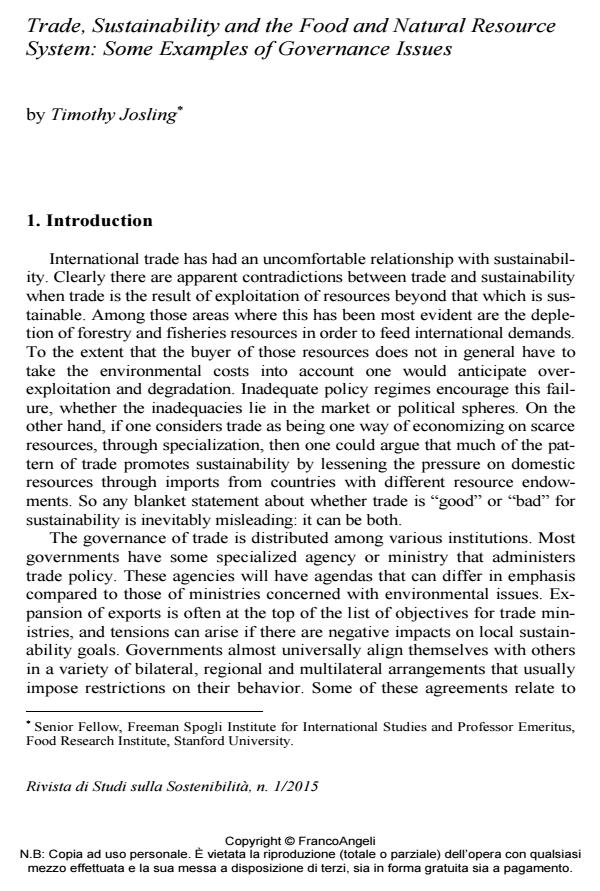Trade, Sustainability and the Food and Natural Resource System: Some Examples of Governance Issues
Journal title RIVISTA DI STUDI SULLA SOSTENIBILITA'
Author/s Timothy Josling
Publishing Year 2015 Issue 2015/1
Language English Pages 17 P. 27-43 File size 207 KB
DOI 10.3280/RISS2015-001003
DOI is like a bar code for intellectual property: to have more infomation
click here
Below, you can see the article first page
If you want to buy this article in PDF format, you can do it, following the instructions to buy download credits

FrancoAngeli is member of Publishers International Linking Association, Inc (PILA), a not-for-profit association which run the CrossRef service enabling links to and from online scholarly content.
Trade in agricultural goods and raw materials provides an important challenge for rule-making at the national, regional and international level. Many of the activities undertaken in the name of efficient agriculture are unsustainable, but unsustainable agriculture does not depend just from the exports level, because it can be found everywhere: in fact, trade in agricultural and food products can both threaten and promote sustainability. At that point the question arises as to what multilateral (or regional) rules are needed specifically to tackle the issue of sustainability and trade? With regards to this question, there are several issues such as property rights to indigenous resources, trade rules governing biofuels, investment in and ownership of land and mineral rights in resource-rich countries. This short paper looks at some specific areas where the issue of global governance, through trade institutions, impinges on farming and fishing practices and related types of raw material trade, by presenting a taxonomy that shows the intersection between government trade activities, trade agreements and sustainability. Particularly, it may consider two categories of government activity in agricultural and raw material trade: taxes or other restrictions and subsidies or other forms of encouragement; these actions can be divided in the direction of sustainability and those that are inimical to that objective. Therefore, the paper will illustrate the interface between trade rules and sustainability objectives, by discussing some examples reflecting these actions/sustainability combinations, such as: the removal of tariffs on environmental goods; restrictions on imports of products produced in an unsustainable way; restrictions on exports of raw materials in the context of scarcity; subsidies to encourage environmental farming practices; subsidies for the production and use of biofuels; and subsidies for fossil fuel usage. The last section links these topics to the issue of gaps in global governance: this item has been recognized in WTO discourse for some time, especially in the Ministerial Declaration on the contribution of the WTO to achieving greater coherence in global economic policymaking. But the search for a cohesive system of governance remains in the hands of the major countries of the world that have to led the way towards the synergy between trade rules and sustainability goals. s.
Keywords: Trade, sustainability, resources, governance, taxes, subidie
- Asche F., Smith M.D. (2010). Trade and Fisheries: Key Issues for the World Trade Organization. Staff Working Paper ERSD-2010-03, January.
- Blandford D., Josling T. (2009). Greenhouse Gas Reduction Policies and Agriculture: Implications for Production Incentives and International Trade Disciplines. ICTSD/IPC Policy Issues No, 1, September.
- Collier P., Venables A.J. (2010). International Rules for Trade in Natural Resources. Journal of Globalization and Development, 1 (1), Article 8.
- Espa I., Rolland S.E. (2015). Subsidies, Clean Energy, and Climate Change. E15 Initiative. Geneva: International Centre for Trade and Sustainable Development (ICTSD) and World Economic Forum.
- Howse R., Josling T. (2012). Agricultural Export Restrictions and International Trade Law: A Way Forward. International Food and Agricultural Trade Policy Council (IPC), Washington DC.
- Hufbauer G.C., Charnovitz S., Kim J. (2009). Global Warming and the World Trade System. Peterson Institute for International Economics, Washington, DC. International Energy Agency (IEA) (2014). Fossil-fuel Subsidies. Chapter 9 in World Energy Outlook 2014, IEA, Paris.
- Josling T. (2012). New Trade Issues in Food, Agriculture and Natural Resources.
- In: Narlikar A., Daunton M., Stern R.M. (eds.) The Oxford Handbook on the World Trade Organization. Oxford University Press, DOI: 10.1093/oxfordhb/9780199586103.013.0030
- Josling T. (2015). “Rethinking the Rules for Agricultural Subsidies”. E15 Initiative. International Centre for Trade and Sustainable Development (ICTSD) and World Economic Forum, Geneva.
- Josling T., Blandford D. (2009). Biofuel Subsidies and the Green Box. In: Melendez-Ortiz R., Bellman C., Hepburn J. (eds.). Agricultural Subsidies in the WTO Green Box: Ensuring Coherence with Sustainable Development Goals. Chapter 18. Cambridge University Press, Cambridge.
- Josling T., Blandford D., Earley J. (2010). Biofuel and Biomass Subsidies in the U.S., EU and Brazil: Towards a Transparent System of Notification. IPC Position Paper, September.
- Singh H.V. (2010). Opening address by the Deputy-Director General at a conference held at the WTO, Geneva, 14 October.
- Vossenaar R. (2014). Identifying Products with Climate and Development Benefits for an Environmental Goods Agreement. Issue Paper No. 19; International Centre for Trade and Sustainable Development, Geneva, DOI: 10.7215/NR_IP_20141128
Timothy Josling, Trade, Sustainability and the Food and Natural Resource System: Some Examples of Governance Issues in "RIVISTA DI STUDI SULLA SOSTENIBILITA'" 1/2015, pp 27-43, DOI: 10.3280/RISS2015-001003